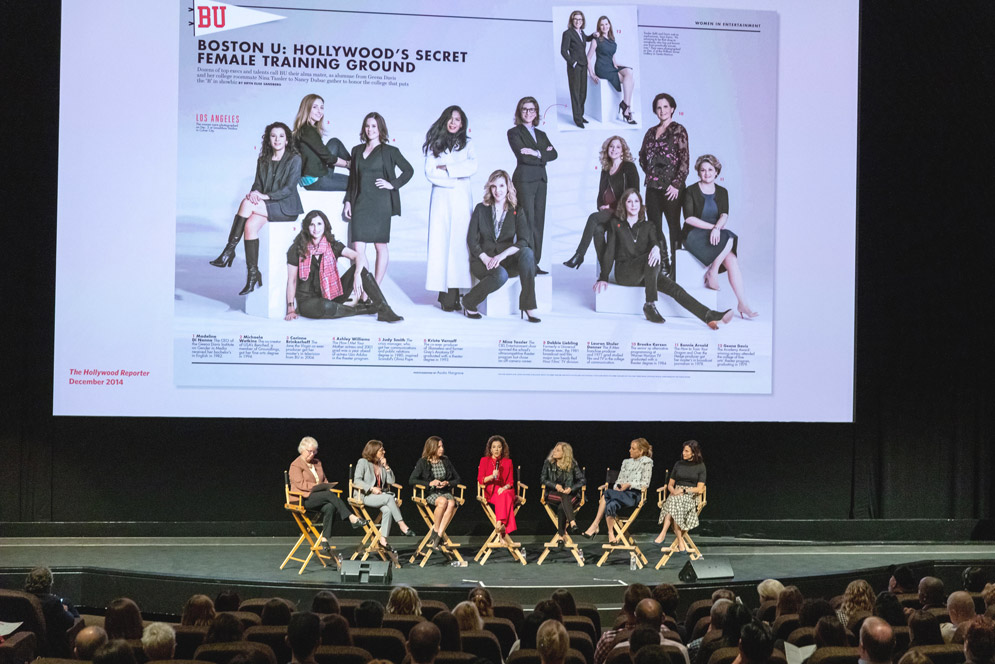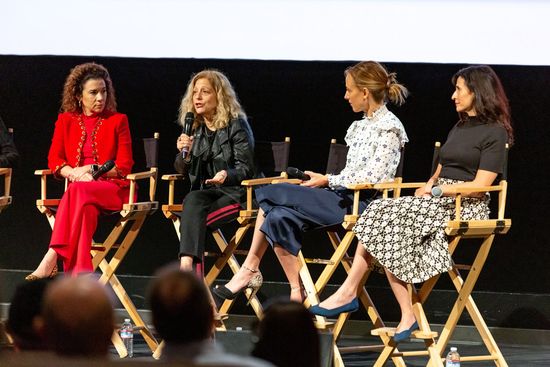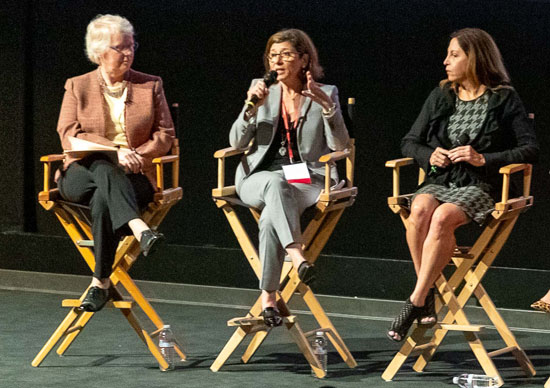Women and Gender Bias in Post-#MeToo Hollywood
Los Angeles event with BU alums sparks discussion about women in media

BU women alums in Hollywood’s entertainment industry kicked off the October 27 event BU Envisions the Future: The Ideas, People, and Media That Are Changing the World.
Actor and comedian Michaela Watkins recalls the day a prospective showrunner matter-of-factly told her that shows written, directed, and acted by women simply don’t succeed commercially.
He made the comment while interviewing for a job on the comedy Benched, which Watkins cocreated for the USA Network, and the remark left a searing impression.
Can you imagine hiring someone who thinks it’s okay to say, “No one cares about you and your life?” said Watkins (CFA’94), who spoke at a forum hosted by the BU Alumni Association October 27 in Los Angeles.
Women’s underrepresentation in film was a key part of the discussion at BU Envisions the Future: The Ideas, People, and Media That Are Changing the World, a daylong event held at Paramount Studios. Seven panels gave participants the chance to talk about Hollywood’s reckoning in the wake of the Harvey Weinstein scandal and rise of the #MeToo movement as well as malicious social media influencers, industry buyouts, and branding in the streaming era. They also had time to schmooze with fellow alums, including Nina Tassler (CFA’79, Hon.’16), a producer and former CBS Entertainment chair, Jim Gianopulos (CAS’73), Paramount CEO, and Bonnie Arnold (COM’78), a producer and former copresident of DreamWorks Animation.
There was much to discuss. On the first panel, It’s Not a Secret Anymore: A Conversation with BU Alumnae, Watkins and fellow panelists, all BU alums, talked about how the #MeToo movement has increased opportunities for women in the entertainment industry. The panel was moderated by Jean Morrison, BU provost and chief academic officer.
Tassler, who left CBS in 2015, didn’t mention her former boss, longtime CBS chief executive Leslie Moonves (Hon.’06), who was accused of sexual harassment and stepped down last month. But she acknowledged her role in the kind of thinking that may have kept women on the sidelines in the industry, describing herself as an extreme “people pleaser,” and someone who never quite expected her rise from talent agent to powerful network executive.
“I was part of the cultural bias,” said Tassler, who founded PatMa Productions earlier this year. “Even women are guilty of cultural bias. We all jumped in and went along with it.”

Cultural biases can help perpetuate myths about women and hold them back, much like the idea that women-driven shows and films don’t attract viewers. Only 4 percent of the directors of top-grossing films between 2007 and 2016 were women, according to ReFrame, a group of studio executives and industry leaders who advocate for gender parity.
That helps explain why women are much less visible than men in films. Women make up just 29 percent of all the leading characters in the top-grossing films, the group says, even though they make up 52 percent of all moviegoers.
It’s a long-standing problem, one that actor Natalie Portman called out at this year’s Golden Globe Awards, noting the list of all-male nominees for director of the year.
Tassler said she’s excited about her work as founder of PatMa Productions. She gets to tell stories with women at the center, such as Lioness: Golda Meir and the Nation of Israel, the company’s first project. She says mentoring and advocacy are important, and her company is especially open to BU students. She also advised new graduates with Hollywood ambitions to be resilient and learn to accept failure.
“So much in this industry is predicated on failure, both TV and film,” she said. “You have to learn to look at it, embrace it, and not let it destroy you.”

Tassler and Watkins were just two of the BU alums on the panel, a group that was also the subject of the 2014 Hollywood Reporter story “Boston University: Hollywood’s Secret Female Training Ground.”
Actor Kim Raver (CGS’87, CFA’91), known for her roles in 24, Night at the Museum, and Third Watch, is producing her first film, Tempting Fate, starring Alyssa Milano. It’s also her directorial debut, and a leap of faith.
As a young actor, Raver said she often worried that if she made too much noise, she would be labeled in the industry as the “the difficult one” and jobs would dry up. “This movement is about finding the mentors and the inspirers,” she said. “There are opportunities—take them.”
Former industry executive Madeline Di Nonno (CAS’82), who is now CEO of the Geena Davis Institute on Gender in Media, says the institute’s research has shown that women-driven films are on the rise, peaking at 27 percent this year. But much work needs to be done.
“We’re not at a tipping point yet, but we see dramatic change happening,” Di Nonno said.
The institute has been at the forefront of gender parity in TV and film since Academy Award–winning actor Geena Davis (CFA’79, Hon.’99) founded the nonprofit in 2004. (Davis and Tassler were roommates at BU.) Its focus is getting television creators to increase the percentage of female characters, and reduce gender stereotyping, in media targeting children age 11 and under.
Davis has been outspoken on the issue for more than a decade, appearing as recently as this past September at the Toronto Film Festival, where event organizers had just agreed to sign a gender parity pledge.

“My new motto is: no more missed opportunities,” Davis told the festival crowd. “If you’re involved in any way in any production of a movie or a TV show, you have a chance to change it and make it gender-balanced. Do a gender pass. Don’t let it get cast or shot until somebody looks at it, and you go through it and you say, ‘Who here can become female?”
Watkins, the writer, actor, and comedian who was told women’s stories didn’t matter, noted that her career has helped to turn the conventional wisdom about those women’s stories on its head.
She stars in the Hulu series Casual as Valerie, a newly divorced woman with a teenage daughter, who both move in with Valerie’s bachelor brother, Alex. The show is a comedy, but also a poignant story about a woman trying to reinvent herself—and her sex life—in middle age.
Watkins said the directorial staff is 82 percent female. Now in its fourth season, Casual was nominated for a 2016 Golden Globe for best television series. A transformation is underway, she said.
“Myths have been busted.”
Megan Woolhouse can be reached at megwj@bu.edu.
Comments & Discussion
Boston University moderates comments to facilitate an informed, substantive, civil conversation. Abusive, profane, self-promotional, misleading, incoherent or off-topic comments will be rejected. Moderators are staffed during regular business hours (EST) and can only accept comments written in English. Statistics or facts must include a citation or a link to the citation.